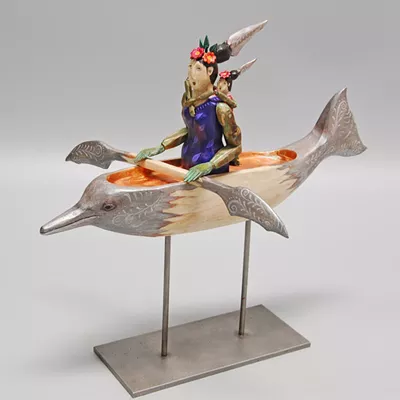For August Strindberg, much like presidential candidate Bernie Sanders today, the political crux of every matter boiled down to the battle between the upper class and everybody else. The 19th century Swedish dramatist was convinced the game was rigged in favor of the rich, but he also felt that rebelling against your station in life—especially if you were a woman—was a sure sign of madness.
His most enduring play, Miss Julie, opened last Saturday at the Rogue Theatre. It's about the fireworks created when the haughty title character starts toying with Jean, the handsome valet employed by her father, the unseen-but-never-absent count. The action unfolds in the estate's kitchen, a cauldron of desire where we also meet Kristine, a servant who knows her place like she knows her bible.
As the play opens, Miss Julie (played with steely, needy abandon by Marissa Garcia) is in quite a mood—even for her—on a festive midsummer night. She's in the next room, dancing with the servants and giving zero fucks about what anybody might think. Later, after a roll in the hay with said valet, she cares very much about her reputation—or what's left of it.
The play, which could have been called "Driving Miss Julie Crazy," proceeds at the Rogue at a deliberate pace that never flags. The actors take to the material with welcome intensity and seemed in perfect sync with each other on opening night.
Holly Griffith plays Kristine, the servant who is engaged to Jean but must constantly check his delusions of upward mobility, with quiet, powerful certitude. Matt Bowdren, playing Jean with full-on passion and smarts, adds another beautifully etched performance to his Rogue resume.
Miss Julie, which takes place in "real time" over 90 minutes, drew scorn from censors even before its Copenhagen premiere in 1889. It was Strindberg's description of sex, of course, that got everybody's knickers into a bunch. The notion of an aristocratic woman getting down and dirty with the help was scandalous enough, but Strindberg's tragedy presented an even more radical idea—that sexual unions can and do happen without the slightest interference from love.
The play was banned throughout much of Europe, including Sweden, where it went unproduced until 1906. Britain's ban on public performances of Miss Julie was not lifted until 1939.
Strindberg claimed the play was inspired by a real incident he heard about involving a young noblewoman who had had sexual relations with a servant. The play was also informed by his childhood years, which he described in an autobiographical novel as being affected by "emotional insecurity, poverty, religious fanaticism and neglect."
The prolific playwright's views about love, loss and class transgressions were also, no doubt, influenced by his beloved mother's death, when August was just 13 years old, and his father's marriage one year later to a household servant.
Miss Julie presents sex as a battlefield and leaves no doubt that the lowly valet will prevail in the end. It almost goes without saying, though, that the reason Jean's future seems so bright is because he is a man, of course. In Strindberg's world, a woman (even an upstairs woman like Julie) had far less control of her destiny than a man (even a downstairs man like Jean) had of his.
The characters in Miss Julie (Jean and Julie, anyway) are wonderfully convoluted people who have multiple motivations for their actions—a pointed contrast with Henrik Ibsen's more rigid brand of modernity. Strindberg's Norwegian contemporary and rival had radical ideas of his own about the opposite sex. However, Ibsen's feminist ideas were delivered within the confines of the well-made play.
Not so, Miss Julie, which places character before plot. As we watch these three humans bounce around in each other's fears and beliefs—with catastrophic results for one of them—it's impossible not to be drawn deeply into their drama. This is survival of the fittest, with references to animal behavior woven throughout. Jean and Julie tremble at the thought of becoming beasts with no station.
Strindberg had issues with women, to be sure. In his preface to the play, a work of art in its own right, he describes his heroine as a woman with a "weak and degenerate brain." The Rogue, perhaps the most serious-minded theater troupe in Southern Arizona, doesn't treat Miss Julie like a misogynistic relic that must be re-interpreted for modern audiences.
Director Cynthia Meier trusts that the writing can stand on its own, and therefore makes no effort to "modernize" the play by dropping its characters into a later era. Strindberg's play is rightly tied to its late 19th century setting. In her hands, more than 100 years after the playwright's death, Miss Julie is very much alive, urgent and sensual.







